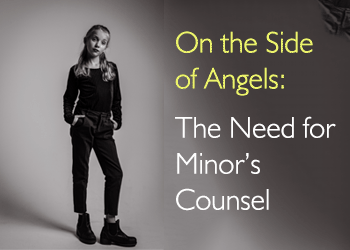On the Side of Angels – The Need for Minor’s Counsel
 Minor’s Counsel is a neutral voice for a child in a legal proceeding such as a Guardianship. Their role is to consider what is in the best interest of the child and report to the court. Economic factors and a rapidly-changing society has increased the need for attorneys to serve as Minor’s Counsel.
Minor’s Counsel is a neutral voice for a child in a legal proceeding such as a Guardianship. Their role is to consider what is in the best interest of the child and report to the court. Economic factors and a rapidly-changing society has increased the need for attorneys to serve as Minor’s Counsel.
Guest Editor Ray Robinson interviewed attorney Nicolas Vaca, who has served as Minor’s Counsel since 2021. He offers valuable insights into this key role. Although the court determines the compensation for these attorneys, they frequently serve with little or no compensation which has led to a member of the legal community to quip that this work is essentially, “Pro Bono with a Tip.” The benefit of helping these children through these proceedings is the reward.
Ray Robinson: When did you get your first court-appointed Minor’s Counsel case?
Nicolas C. Vaca: April 7, 2021
RR: What motivated you to become a Minor’s Counsel?
NV: For approximately four years I was fortunate enough to be the Probate Facilitator for the court. During my tenure I sat in court and witnessed guardianship cases and admired the commitment Minor’s Counsel demonstrated to the well-being of the minors as they reported to the court. I also witnessed the important role Minor’s Counsel played in advising the judge on the actions that should be taken with each case. I want to be one of those attorneys who provided this kind of service.
RR: Did you receive any specialized training or participate in MCLE before becoming a Minor’s Counsel?
NV: As mentioned above, I was able to witness guardianship cases as they came before the court. I also took several MCLE courses that related directly to guardianship. Also, as the Probate Facilitator, I held workshops where I assisted pro bono applicants in completing their guardianship applications. These workshops allowed me to interact one-on-one with the applicants, answer questions they had regarding the application process and advise them on the long-term implications of becoming a guardian.
RR: What are some of the main challenges when serving as Minor’s Counsel?
NV: As Minor’s Counsel you are the eyes and ears of the court. The judge presiding over the case relies, in large part, on you and the report you provide in determining what actions it should take in the matter. As a consequence, it is important that you provide the court with what you believe it needs to know in order for the judge to make thoughtful and reasonable decisions. This is not always easy. Some petitioners do not easily open up to a stranger assigned to their matter and thus as Minor’s Counsel you must tread carefully in developing a positive relationship with the applicant and the minor to elicit what you believe are important facts relating to the best interest of the minor.
RR: The need for attorneys to participate as Minor’s Counsel seems to be growing rapidly. What do you think is behind the rapid growth?
NV: It is, I believe, the consequence of economic factors and a rapidly changing society that are the driving factor in the growth. Many of the petitions for guardianship are the result of parents who are economically unable to care for their child and need someone to care for her/him while they try and establish themselves financially. For some parents this is a distinct possibility; for others it is a goal they cannot reach. Another driving factor is the growth of substance abuse – alcohol and drugs – by parents who are so debilitated by their dependence that they cannot care for the minor. As joblessness and substance abuse grow among the population, so will petitions for guardianship and thus the need for Minor’s Counsel.
RR: What are some of the benefits of serving as Minor’s Counsel?
NV: You get to meet extremely committed and thoughtful individuals who have stepped up to care for the minor. Becoming a guardian is a major commitment. If the minor is an infant or a young child, the guardian is potentially committed until the child is 18 years of age. If the minor is in her/his teens, the guardian is committed to dealing with a minor who is passing through some of the most difficult years of her/his life. These difficult years can be tumultuous and troubling for the minor and extremely trying for the guardian. Getting to know these individuals provides reassurance in the goodness of people and hope for the future of the minor.
RR: What advice would you give an attorney contemplating participation in the Minor’s Counsel program?
NV: Look forward to a challenging practice. Approach each matter with compassion and understanding. Understand that the legal system can provide only limited assistance to both the applicant’s and minor’s life. Keep in mind that while you may see dozens of cases each year, for each applicant and minor their case is of the utmost importance, and so it should be for you.